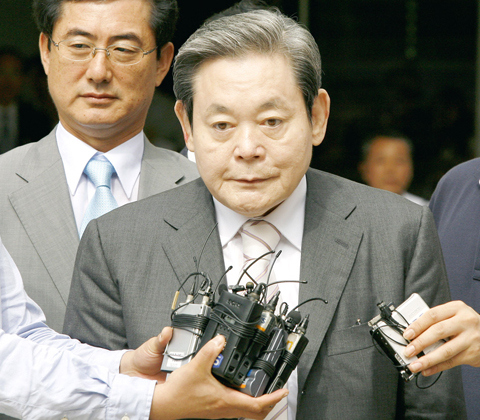South Korea’s richest man, Lee Kun-hee, returned yesterday as chairman of global giant Samsung Electronics, almost two years after stepping down following a probe into his business dealings.
Three months after Lee received a presidential pardon for tax evasion, the company said it needed his leadership “to take the upper hand in the global market amid the world economic crisis.”
The 68-year-old, however, expressed uncertainty about the future as Samsung tries to grow in the face of increasing low-cost Chinese competition.

PHOTO: AFP
“This is a time of real crisis. Global companies are crumbling. We don’t know what will happen to Samsung either,” a company statement quoted him as saying when he agreed to return at the request of its executives. “Within 10 years, all Samsung products may disappear. Now, we have to start anew. Let’s move on, with eyes set straight ahead.”
During his 20 years as chairman, Samsung Electronics became the world’s largest maker of computer memory chips and second-biggest manufacturer of mobile phones.
He resigned in April 2008 after being charged with tax evasion and breach of trust, but in December he received a special pardon so he could resume his suspended membership of the International Olympic Committee and work to bring the 2018 Winter Olympics to South Korea.
Samsung Electronics reported annual earnings of more than US$8 billion last year, along with record sales. It employs 164,600 people in 61 countries and is competing with Hewlett-Packard for the status of the world’s biggest technology firm by revenue, but Korea Investment Securities’ analyst Kim Jung-hoon said there was lingering uncertainty because of the effects of the global downturn as well as Chinese rivals that are fast catching up with South Korean firms.
“In the current situation, strong leadership is required. Lee’s return to the helm of the world’s largest producer of LCD panels and DRAM memory chips will be a great boon to the country’s economy,” Kim said.
Samsung Electronics shares closed up just 10,000 won (US$8.80), or 1.24 percent, at 819,000 won.
Kim Young-june, analyst with LIG Investment and Securities, told Dow Jones Newswires that Lee’s return was positive for the company’s management strategy.
“He might have decided to return to play a powerful leadership role in finding a future growth engine to capture a leading global position after the company survived the global financial crisis in good shape,” Kim Young-june said.
Solidarity for Economic Reform, a group campaigning for better corporate governance, however, said Samsung had turned its back on reform promises made two years ago.
“Samsung’s promise to reform made in April 2008 turned out to be a public fraud only aimed at winning a favorable court ruling,” it said in a statement.
Lee is the son of the founder of the Samsung group of companies, whose products or services touch every aspect of South Koreans’ lives. His own son, Jae-yong, is being groomed as a third-generation successor.

SECURITY: As China is ‘reshaping’ Hong Kong’s population, Taiwan must raise the eligibility threshold for applications from Hong Kongers, Chiu Chui-cheng said When Hong Kong and Macau citizens apply for residency in Taiwan, it would be under a new category that includes a “national security observation period,” Mainland Affairs Council (MAC) Minister Chiu Chui-cheng (邱垂正) said yesterday. President William Lai (賴清德) on March 13 announced 17 strategies to counter China’s aggression toward Taiwan, including incorporating national security considerations into the review process for residency applications from Hong Kong and Macau citizens. The situation in Hong Kong is constantly changing, Chiu said to media yesterday on the sidelines of the Taipei Technology Run hosted by the Taipei Neihu Technology Park Development Association. With

CARROT AND STICK: While unrelenting in its military threats, China attracted nearly 40,000 Taiwanese to over 400 business events last year Nearly 40,000 Taiwanese last year joined industry events in China, such as conferences and trade fairs, supported by the Chinese government, a study showed yesterday, as Beijing ramps up a charm offensive toward Taipei alongside military pressure. China has long taken a carrot-and-stick approach to Taiwan, threatening it with the prospect of military action while reaching out to those it believes are amenable to Beijing’s point of view. Taiwanese security officials are wary of what they see as Beijing’s influence campaigns to sway public opinion after Taipei and Beijing gradually resumed travel links halted by the COVID-19 pandemic, but the scale of

A US Marine Corps regiment equipped with Naval Strike Missiles (NSM) is set to participate in the upcoming Balikatan 25 exercise in the Luzon Strait, marking the system’s first-ever deployment in the Philippines. US and Philippine officials have separately confirmed that the Navy Marine Expeditionary Ship Interdiction System (NMESIS) — the mobile launch platform for the Naval Strike Missile — would take part in the joint exercise. The missiles are being deployed to “a strategic first island chain chokepoint” in the waters between Taiwan proper and the Philippines, US-based Naval News reported. “The Luzon Strait and Bashi Channel represent a critical access

Pope Francis is be laid to rest on Saturday after lying in state for three days in St Peter’s Basilica, where the faithful are expected to flock to pay their respects to history’s first Latin American pontiff. The cardinals met yesterday in the Vatican’s synod hall to chart the next steps before a conclave begins to choose Francis’ successor, as condolences poured in from around the world. According to current norms, the conclave must begin between May 5 and 10. The cardinals set the funeral for Saturday at 10am in St Peter’s Square, to be celebrated by the dean of the College